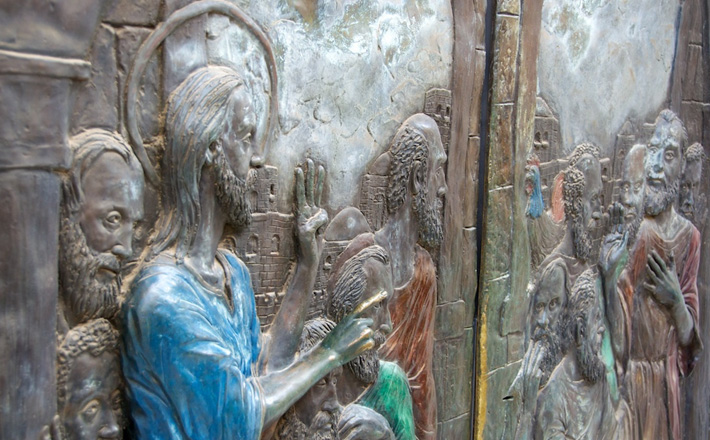Commentary on Matthew 27:11-54
This day is an image of ourselves and of the God who comes as a power so great that resurrection defeats even cruel execution.
The church is called to reckon with paradox on this day: triumph and rejection, death and rebirth. This day is the entrance into the most holy time of year when all the most profound truths of human life are exposed.
Liturgically, this day confuses some pastors and congregations. Every year someone raises the question why we are celebrating both Jesus’ praise-filled entrance into Jerusalem on that donkey with all those palm fronds and then quickly turning to his murder. The answer is the most central truth about our faith: both winning and losing happen all the time together and in that complex journey is where we find Jesus … owning all of it with us while defeating it. Today gives us the image of cheering crowds, glad to have their “savior” entering into the city, and the image of the cruel machinations of the powerful who know their stranglehold on the rabble must be locked in by the exercise of strong and uncompromising contempt.
This story is not a documentary; it is also not a fiction. Instead, it is a proclamation of faith. From it, we receive the face of God in the midst of desolation. It is a face of resignation and deep comprehension. The failings of the people who create this abomination — and that of all victimization in human history — is known intimately by God. Even more vividly, God knows the pain of victims. Those who suffer without rescuers, those who are tormented and never defended, those who are counted as nothing, those who are mocked and tortured — all these are the ones whose lives Jesus takes on himself in this great story.
When we look at the human actions in the longer Gospel reading for today, we see many depictions of normal life, including among others: betrayal, meal preparation, distress over the presence of evil even at a table of friends, deception revealed, boasting, failure to help someone in need, using a kiss to signal its opposite meaning, physical hurt, desertion, an arrest, deviousness, abuse of a beloved teacher, denial of friendship, bitter self-contempt, repentance, suicide, confusion on the part of a political leader, receipt of a prophetic dream, mocking a vulnerable and abused person, murder, and attempting to keep a lid on the zeal of Jesus’ followers. Whew. That’s a lot of treachery for one Sunday.
And it calls for a litany of what God is doing because that is the other side of the coin. The humans are full of plotting, neglect, and finally killing what is good. Unless you look carefully, God, on the other hand, doesn’t seem to be doing much. The humans are going about their business without divine power swooshing in to rescue or transform anyone — sort of what people ask about life today. Where is God when things are not going well? Have we been abandoned?
When we ponder this story, however, we find God’s power deeply at work in Jesus. Look at how Jesus is depicted, how the power of the holy one is portrayed. Jesus is either speaking of himself as Son of Man (a title scholars are still working out) or mostly silent. At the meal, Jesus “took his place with the twelve.” He knows, according to Matthew, what is going to happen. He knows his betrayer. His major speech — the one we remember every week — occurs at the table. He tells them the bread they are about to dine on is his body; the wine, his blood. His friends should remember him when they eat together.
This does not sound like the sort of thing a really grand and triumphant god would say. It sounds rather ordinary: the sort of thing we say in our families and friendship circles. Don’t forget me. At the end, he cries out his sorrow. Divine action here is made of the ordinary stuff of life — food and eating together. It points to a power that has taken up residence in the most basic needs of life. Even the most mundane of earthly acts — taking nourishment — is infused with the presence of the holy one. The bread of life is the holy one.
Given such a long Gospel text, preachers have many options for thematic focus. One of those is to explore the power relationships as they play out in the story and in our own time. This can be handled with either the full or the abbreviated reading. The particular context of power is most evident in the shorter version of the Passion story because it crystallizes the negativity by its bookending: 1) The opening zeroes in on Pilate’s questioning while 2) ending with the centurion’s amazed realization that the dead man was not your average rabble-rouser.
By starting with the government representative’s lording-it over Jesus and closing with the high-ranking Roman soldier having seen beyond the cultural dictates, the shorter reading gives the preacher an opportunity to bring in the political role of those who maintain power by drowning out threats to their self-serving status. The fact that Jesus so upset his detractors is a way for the preacher to explore with the assembly what his life, death, and resurrection mean in our own politicized and dangerously unjust time.
Who, for instance, is most threatened today by Jesus’ call to care for children and the poor? Whose politics today support or deny the command to be our sisters’ and brothers’ keeper? Jesus’ teaching about generosity is frightening to some people. It is easier to ignore inconvenient problems or silence the advocates of justice than to create a just society. This dangerous truth is ripe for Palm/ Passion Sunday.
Above all, this is a day for laying out the crucifixion. This is not yet the resurrection story. Tempting as it is to introduce a triumph at the end, it isn’t there in the reading. It isn’t for today. Don’t rush it.


April 13, 2014